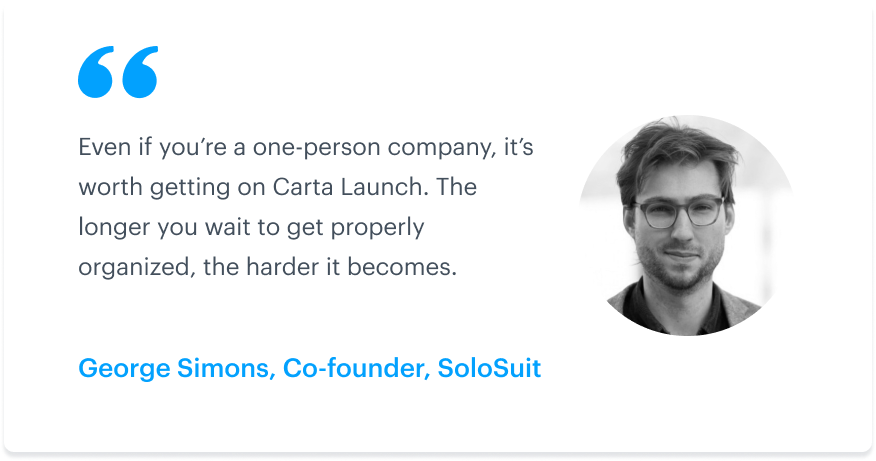Running a business isn’t for the faint of heart. According to a survey by Fundera, small business owners tend to work a lot harder and earn a lot less than the average worker, with 81% working nights and 89% working weekends.
The only thing crazier than running a business: doing it while you’re in school.
Enter George Simons, an MBA candidate at Brigham Young University, law school fellow, professional writer, and co-founder of multiple companies. One of the companies he’s running is SoloSuit, which helps people respond to their collection lawsuit. The software used by SoloSuit was developed in 2017 by LawX, the legal design lab George participated in at BYU law school.
While running a company, working several jobs, and going to school at the same time might seem crazy, George is using his position to inform his entrepreneurial inclinations. As he’s studied and worked with a bunch of companies, he’s seen his fair share of mistakes and is continually using what he’s seen to inform how he runs SoloSuit.
Here’s what George says companies should think about in their early stages.
Have a clear problem you’re trying to fix
First things first: make sure your product or service solves a common problem. This is the best way to ensure your idea has legs and people will use it.
In SoloSuit’s case, George’s LawX design lab noticed that “every year, 54,000 people in Utah are sued for debt. That makes up over half of all the cases in the state. In pretty much all of the cases, the defendant would lose the case simply because they didn’t respond to the lawsuit.”
When the class saw that, they immediately knew they could help a lot of people by creating a tool that would help these people respond to their lawsuits. To date, SoloSuit has already helped 1,100 people, saving them over $2.1 million.
Pick the right law firm
As a law student, George knows first-hand how important it is to find the right law firm for your business. After all, they are the people that’ll help you form your company, walk you through the fundraising process, and more.
The problem: there are a ton of different options out there. From self-serve platforms like Clerky to full-fledged firms, it can be difficult to choose.
In order to overcome choice paralysis, George recommends really thinking about what your preferences are and what your business needs. For example, he knew he wanted a tech-enabled law firm that would help him streamline processes. He explains, “since I’m doing a JD/MBA, I spend quite a bit of time thinking about the inefficiency of most legal processes, and I’m very aware of how the quality of lawyer work can vary.”
This led him to Savvi Legal (where he worked previously), which “is a combo of a law firm and a tech platform,” explains Samantha Scott, a General Counsel there. “Our tech platform automates a lot of the standardized legal documents like entity formations and equity grants.”
Even better, the price was right for a small company like SoloSuit. “We have lawyers that can provide customized services, but a lot of it is standardized to keep the cost down for startups,” Samantha notes.
To learn more about how SoloSuit works with Savvi, download our case study:

Download the Case Study
Think carefully about who you want on your cap table
Your company’s cap table matters. It’s who you’re (hopefully) making wealthy and powerful in the world. As such, it’s important to think about who you want to own part of your company, whether they’re investors, cofounders, or employees.
When George was looking for a new cofounder, he knew he wanted to find someone who was as invested in SoloSuit as he was. “I wanted somebody who would really think strategically with me—a whole partner in the business.”
George knew that owners tend to be more invested in their work, so he also wanted to find someone who’d take ownership in the company seriously. While he talked to multiple people who had the technical skills, he kept searching until he found the right fit. “The guy I ended up bringing on was more deliberate and thoughtful about ownership in the company and what that means.”
While George’s search took some time, now he can rest easy knowing his cofounder is invested in SoloSuit’s success.
Figure out what type of business you want to be
One of the most important (and first) decisions you’ll have to make is what corporate structure your business should have.
It’s easy to get trapped only thinking about your current situation, but don’t forget to think about how these decisions will affect your company in the future. “One of the issues that comes up the most is when companies form as an LLC and then when things become real, they realize that they actually need to be a Delaware C-Corp in order to take on investments,” warns George. “At that point it costs a lot more money than if they’d just done it right from the beginning.”
In other words, while an LLC might be cheaper upfront, it could cost a lot of time and money if you decide you want to incorporate later. Before deciding, George recommends thinking about how big you want to scale your business and whether it’s worth forming a C-corp early on so you don’t have to spend a bunch of time and money converting later.

Stay organized
George is hyper-focused on getting things right from the very beginning, knowing things will only get harder as SoloSuit gets bigger.Case in point: even though SoloSuit’s cap table is about as simple as cap tables can be, George knew how important it is to start off on the right foot. “I believe that it’s important to get the cap table right from the get-go because it only gets more difficult to get it right the longer you wait. That’s what I’ve seen with other companies that I’ve worked with before. It’s important that the governance is right and that the cap table is right.”
That’s why George had Savvi onboard SoloSuit onto Carta Launch—Carta’s free cap table management software for early-stage companies available through law firms. “Even if you’re a one-person company, it’s worth getting on Carta Launch. The longer you wait to get properly organized, the harder it becomes.”
DISCLOSURE: This communication is on behalf of eShares Inc., d/b/a Carta, Inc. (“Carta”). This communication is not to be construed as legal, financial or tax advice and is for informational purposes only. This communication is not intended as a recommendation, offer or solicitation for the purchase or sale of any security. Carta does not assume any liability for reliance on the information provided herein.